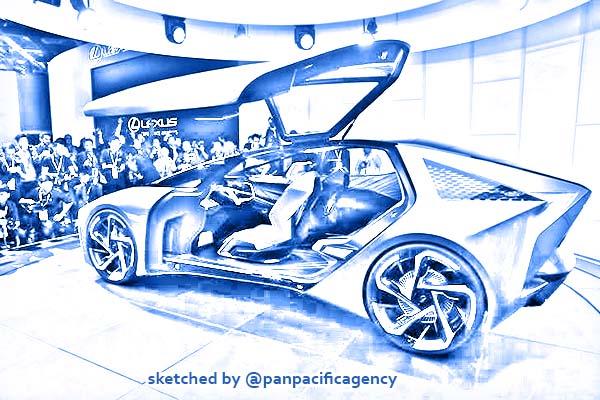Thailand ‘to be regional electric vehicles hub’ in five years: Govt

People look and take photos of Lexus' new LF-30 electric vehicle concept car as it is unveiled at the Tokyo Motor Show, in Tokyo, Japan October 23, 2019. REUTERS/Edgar Su. Sketched by the Pan Pacific Agency.
BANGKOK, Mar 11, 2020, Bangkok Post. The government has announced a policy to make Thailand a regional hub of electric vehicles in five years. Deputy Prime Minister Somkid Jatusripitak made the announcement at Government House on Wednesday in his capacity as the chairman of the National Electric Vehicle Policy Committee, Bangkok Post reported.
“Strategies are in place for all parties to make Thailand an electric vehicle production base within five years. The Industry Ministry, the Energy Ministry and the Transport Ministry will implement the strategies with relevant parties,” he said.
The strategies include electric vehicle use by governmental organisations and state enterprises and the introduction of electric buses and electric motorcycle taxis, the deputy prime minister said.
“The goal is to become an Asean hub… Obstacles will be reduced. Markets will be built in relation to vehicle demand and charging stations. There will be promotional privileges for both vehicles and batteries,” he said.
PTT Plc and the Electricity Generating Authority of Thailand would help one another to build more charging stations, instead of competing, and the Board of Investment would work out promotional privileges for the development, he said.
“Charging stations should be within a radius of 200 kilometres from one another,” he said.
Industry Minister Suriya Jungrungreangkit said by 2030 the country would produce at least 750,000 electric vehicles a year, constituting 30% of its total automobile manufacturing capacity. There should be 53,000 electric motorcycle taxis in two years and 5,000 electric buses in five years, he said.
Energy Minister Sontirat Sontijirawong said 500 electric motorcycle taxis would be deployed in Bangkok in July.